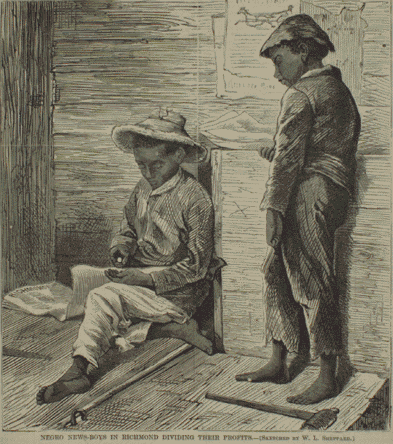"I cannot authorize the gratuitous issue of the Bureau's clothing"
Captain McDonnell writing to Captain Jackson on July 27, 1867.

Aid
|
The South suffered severe economic damage, and a collapse of the
slave-based labor sytsem during the Civil War and Reconstruction. This
tumultuous time
was characterized by economic difficulties in both white and black
communities. Many of
the South's resouces were expended or destroyed during the war years
leaving the entire South, including the Shenandoah Valley, in a dire
economic
condition. As a result, there were many requests for aid for very basic
items, including food, clothing, and shelter.
Just as in every other function of the Bureau, funding was very limited for aid. Jackson expressed a desire to grant aid for many destitute individuals, however, he was overruled by Captain John A. McDonnell of the Bureau on a number of occasions. There are many examples of letters where either Jackson or his supervisor McDonnell, who was stationed in Winchester, had to limit the amount of aid doled out. Even in desperate circumstances, Jackson was very careful with where to allocate his resources. McDonnell, similarly, recognized the scarcity of funds, and rejected aid for individuals who seemed to desperately need it. These measures were necessary because of the small quantity of aid available to Jackson and other Bureau agents. Just as in the construction of schools, one method for the Bureau to fund efforts to relieve the suffering of the destitute was to use the funds of northern aid societies. These societies donated a wide variety of goods, including clothing and food. One aspect of the Bureau that held back its success was the high level of bureaucracy. Even when funds existed, often miscommunication or mistakes led to it not being appropriated. This was a result of mishandling which on Jackson's part can be partially attributed to the huge task he was charged to carry out, and also to the paperwork and bureaucracy which he had to work through. He was perpetually reminded by McDonnell that he had to fill out more forms or make his forms more accurate. The strict attention to procedure demanded much of Jackson's time; time which he could have devoted to the freedmen and destituite whites.
 |